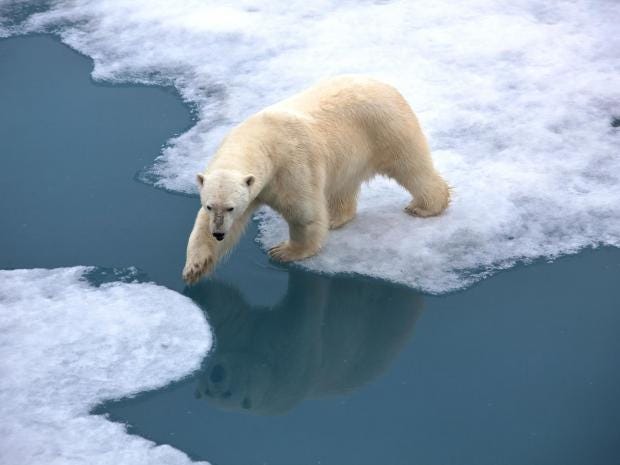Evidence Mounts Against So-Called Climate Change Hiatus
This has been confirmed with the latest research from the Arctic:
Warming of the Arctic is ‘unprecedented over the last 1,500 years,’ scientists say - The Washington Post
From the Independent:
Arctic climate 'report card' reveals ‘rapid and dramatic changes’ to the polar environment
Warming temperatures represent 'an emerging new normal' for the region, warns the US National Oceanic and Atmospheric Administration
Josh Gabbatiss Science Correspondent
a day ago

Significant reductions in sea ice pose a threat to the animals that call the Arctic their home Sepp Friedhuber/Getty Images
The devastating impact of climate change in the polar regions has been confirmed by the US National Oceanic and Atmospheric Administration's (NOAA) annual Arctic Report Card. Authors from the American scientific agency concluded that 2017 was not a record-breaking year in terms of climate extremes, there was still evidence that the Arctic is warming at twice the rate of the global average. The widespread environmental changes that arise as a result of this warming are beginning to define “an emerging new normal” in the region, the report said.
READ MORE
UK must do more to combat climate change, say indigenous leaders
From the Arctic’s melting ice, an unexpected digital hub
Arctic Ocean fishing ban welcomed by scientists and environmentalists
The year saw close to the warmest air temperatures ever recorded – second only to last year’s. There were also above average ocean temperatures, continued loss of sea ice and various negative effects on the people and ecosystems of the Arctic. Aside from the lowest ever measurements for maximum winter sea ice area, the authors reveal that ice is also getting thinner every year.
The report was released at the American Geophysical Union’s autumn conference in New Orleans. “The rapid and dramatic changes we continue to see in the Arctic present major challenges and opportunities,” said Dr Timothy Gallaudet, acting NOAA administrator. “This year’s Arctic Report Card is a powerful argument for why we need long-term sustained Arctic observations to support the decisions that we will need to make to improve the economic well-being for Arctic communities, national security, environmental health and food security.”
The peer-reviewed report is made up of work from over 80 scientists from 12 nations, and aims to provide the most up-to-date information on the current status of the Arctic. It is produced every year by NOAA in order to provide a general update on the region’s status and inform decision making. This year, the publication also includes special reports on the impact of warming on the highly valuable Eastern Bering Sea fisheries, wildfires in the Arctic and the permafrost thaw that compromises Arctic infrastructure.
“This report is further evidence of the dramatic change occurring in the Arctic – from rapidly warming temperatures to dwindling sea ice to melting permafrost. And it’s not only the ecosystems, wildlife and people of the Arctic being affected,” said David Aplin, interim managing director for US Arctic programmes at WWF. “The path forward is clear: climate change mitigation is absolutely vital. We need to reduce emissions, end our reliance on fossil fuels, and embrace a clean energy future – for the good of our planet, its people and wildlife."
Arctic climate 'report card' reveals ‘rapid and dramatic changes’ to the polar environment | The Independent
And these pictures say it all:
Heart-Wrenching Video Shows Starving Polar Bear on Iceless Land - National Geographic
Video of starving polar bear in Canada's Arctic re-ignites conversations about climate change | Georgia Straight Vancouver's News & Entertainment Weekly
.
.
.
No comments:
Post a Comment